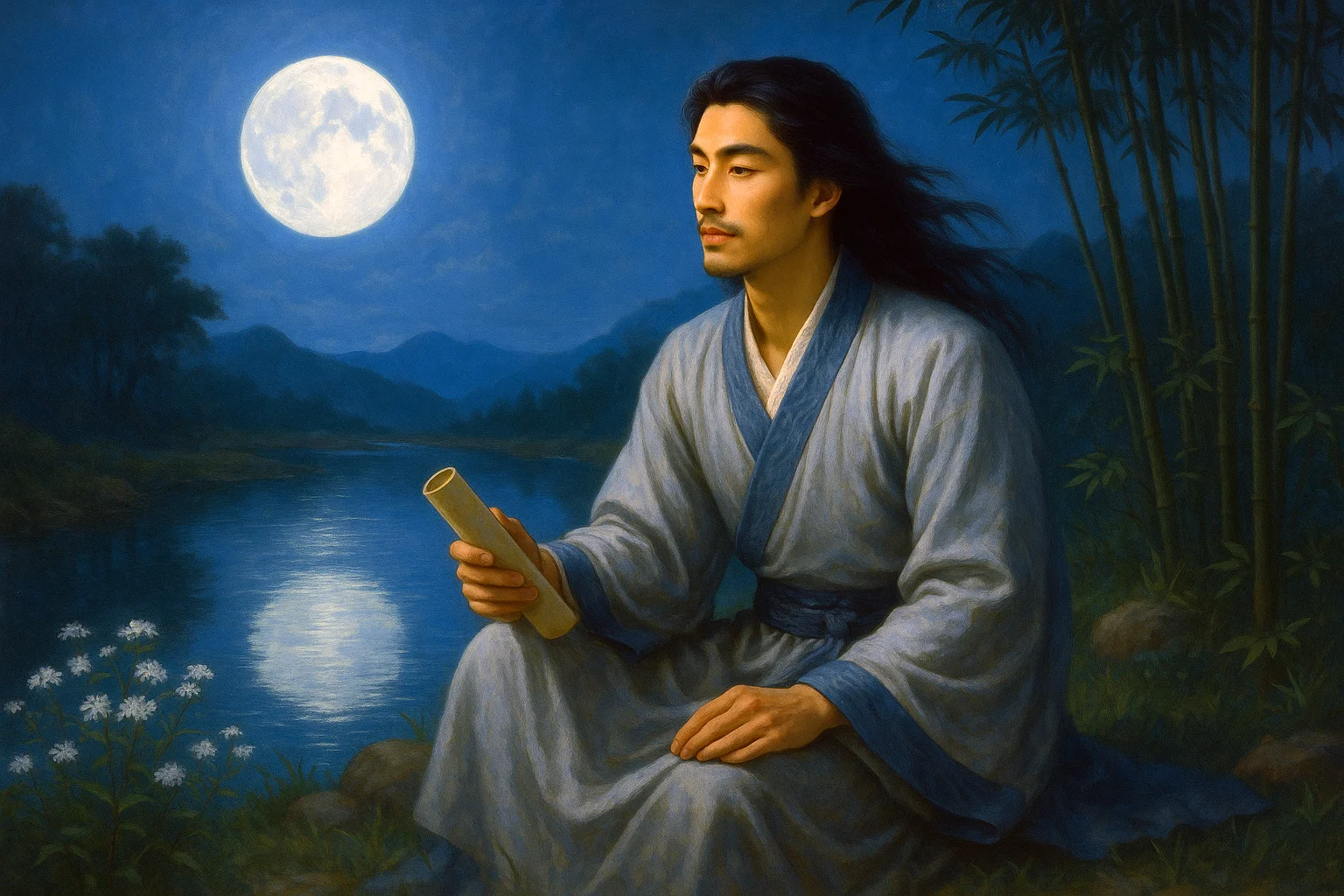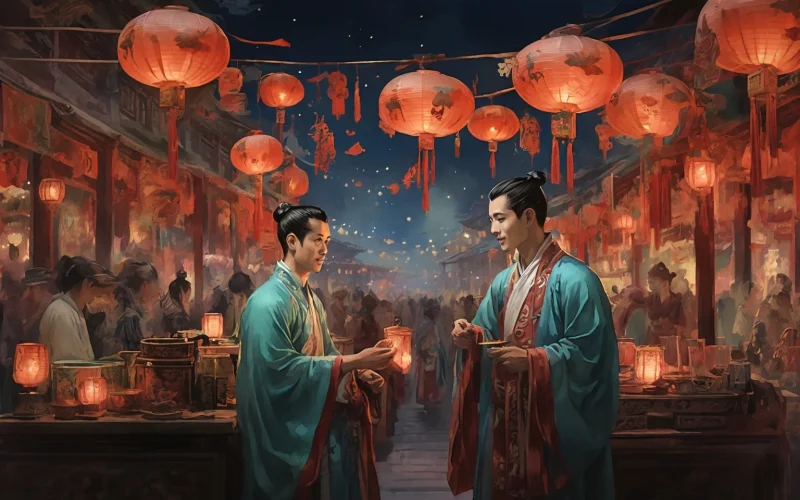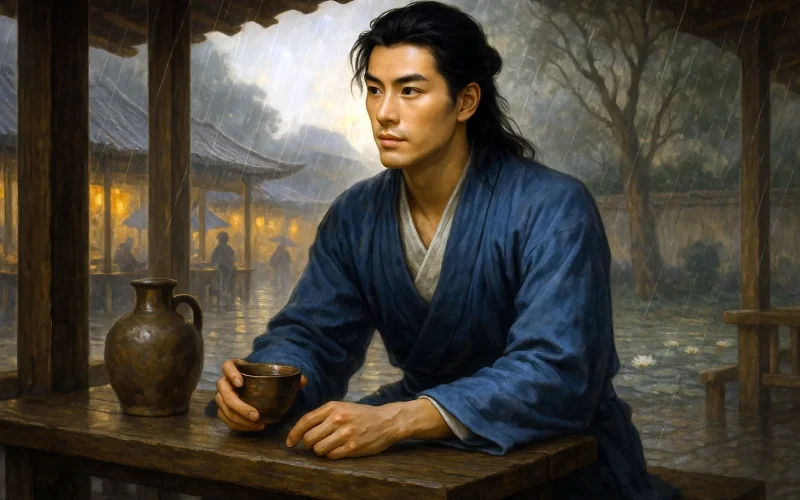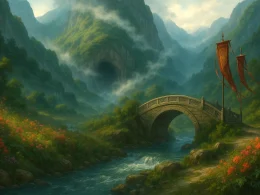The oil lamp's duel with rats shadows my inkstone,
A waning moon, crows' dirge, far bugles moan.
Exiled where rivers meet—poverty's lease,
Mountains shut—yet dreams fold space to hometown's peace.
Summer anxieties breach my crimson core,
All deeds dissolve into temples' silver sore.
Who'll lend me wings to outrace homing birds?
No more delays—just the horizon's blurred words.
Original Poem
「遗兴」
曾巩
青灯斗鼠窥寒砚,落月啼乌送迥笳。
江汉置身贫作客,溪山合眼梦还家。
夏忧忽忽丹心破,万事悠悠两鬓华。
谁与健帆先度鸟,更无留滞向天涯。
Interpretation
Composed during Zeng Gong's period of political exile and personal tribulations in southern China, this poem reveals the scholar-official's nocturnal solitude, homesickness, and lament over unfulfilled ideals. The title "Yí Xìng" (遗兴) - literally "leftover inspirations" - metaphorically represents abandoned ambitions and lingering regrets. Despite his predicament, the poem ultimately affirms Zeng's unwavering moral integrity.
First Couplet: "青灯斗鼠窥寒砚,落月啼乌送迥笳。"
Qīng dēng dòu shǔ kuī hán yàn, luò yuè tí wū sòng jiǒng jiā.
By dim lamp's glow, rats scuffle peering at cold inkstone; / The setting moon, crows' caws escort distant bugle's tone.
The desolate imagery - flickering lamp (青灯), rodent infestation (斗鼠), and freezing inkstone (寒砚) - paints an austere study scene. The auditory elements of cawing crows (啼乌) and faraway horns (迥笳) enhance the atmosphere of solitary exile.
Second Couplet: "江汉置身贫作客,溪山合眼梦还家。"
Jiāng Hàn zhì shēn pín zuò kè, xī shān hé yǎn mèng huán jiā.
Between Yangtze and Han, a destitute stranger I reside; / Closing eyes to stream-mounts, in dreams my homeland I ride.
The geographical markers (江汉) emphasize displacement, while the dream journey (梦还家) reveals intense nostalgia. The couplet's reality-dream dichotomy underscores the poet's psychological torment.
Third Couplet: "夏忧忽忽丹心破,万事悠悠两鬓华。"
Xià yōu hū hū dān xīn pò, wàn shì yōu yōu liǎng bìn huá.
Summer melancholy fractures my crimson loyal heart; / Endless affairs render twin temples' hair apart.
The "crimson heart" (丹心) symbolizes unappreciated loyalty, now shattered. The physical manifestation of stress in graying hair (两鬓华) poignantly measures time's passage against unfulfilled potential.
Fourth Couplet: "谁与健帆先度鸟,更无留滞向天涯。"
Shéi yǔ jiàn fān xiān dù niǎo, gèng wú liú zhì xiàng tiān yá.
Who'll join me hoisting vigorous sails past flying birds? / No more delays - straight to horizon's verge we'll race forwards.
The concluding nautical imagery (健帆) transforms despair into determined transcendence. The rhetorical question seeks kindred spirits for spiritual journeying, rejecting worldly stagnation (留滞) for celestial pursuit (天涯).
Holistic Appreciation
This is a lyrical poem rich in imagery, where emotion and scenery blend seamlessly. Set against the backdrop of night, the opening lines establish an atmosphere of solitary chill and silence, then transition into the poet’s lament over a life of wandering and homesickness. Further, it delves into the profound sorrow of shattered dreams and fleeting youth, before culminating in an unyielding resolve—a lofty aspiration to set sail toward distant horizons. Through layered imagery, the poet conveys an inner journey from melancholy desolation to resolute grandeur, creating a rhythmic shift from restraint to elevation. This reveals Zeng Gong’s indomitable spirit beneath his composed exterior.
Artistic Merits
- Dense Imagery, Evocative Atmosphere
Phrases like "a lone lamp battling mice" (青灯斗鼠 qīng dēng dòu shǔ), "frost-rimmed inkstone" (寒砚 hán yàn), "cawing crows" (啼乌 tí wū), and "distant reed pipes" (迥笳 jiǒng jiā) construct a vivid "cold night" scene, heavy with psychological undertones. The desolate setting mirrors the poet’s isolation, intensifying the poem’s emotional weight. - Emotional Progression, Structure Rising from Restraint
Beginning with the hardships of exile and a frugal life, the poem escalates into reflections on broken ideals, then ascends to a determined call for renewal and departure. This layered emotional arc lends the work both structural tightness and emotional depth. - Concise Language, Fusion of Scene and Sentiment
Zeng Gong’s crisp, uncluttered diction captures profound introspection. Scenery embodies emotion; emotion carries aspiration. Realistic details coexist with idealistic radiance, showcasing an artistic tone both profound and austere.
Insights
This work embodies the unbroken spirit of an intellectual whose political dreams have faltered, yet who clings to grand ambitions. Amid adversity, the poet remains steadfast; in solitude, he yearns for home and comrades; in disillusionment, he still longs for freedom and uncharted paths. Such poetic vision not only conveys fidelity to ideals but also offers modern readers strength to confront life’s trials and keep pursuing their true north.
About the Poet

Zeng Gong (曾巩, 1019 - 1083), a native of Nanfeng in Jiangxi province, stands among the illustrious "Eight Great Masters of Tang-Song Prose." His writings distinguished themselves through an elegant classical balance, celebrated for their rigorous argumentation and refined literary craftsmanship. While his poetry embraced an artless subtlety, his prose achieved what critics hailed as "the very essence of purity" - an achievement that, though perhaps less dazzling than his contemporaries like Su Shi or Wang Anshi, earned him posthumous reverence as the founding master of the "Nanfeng Literary School."












